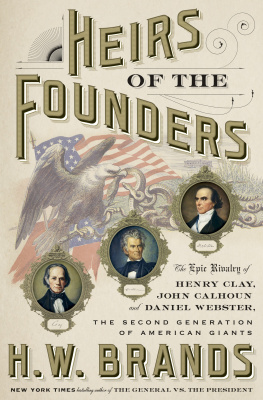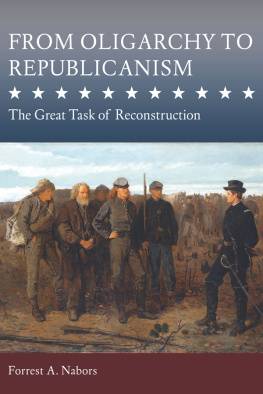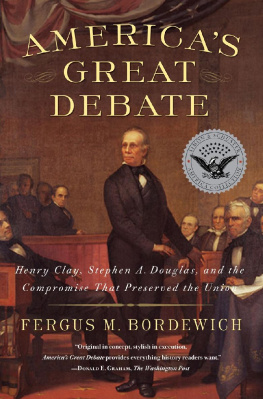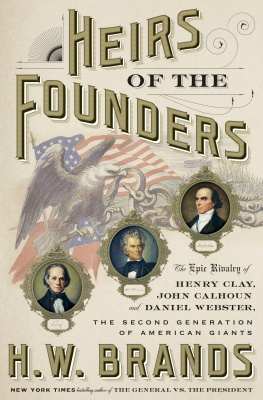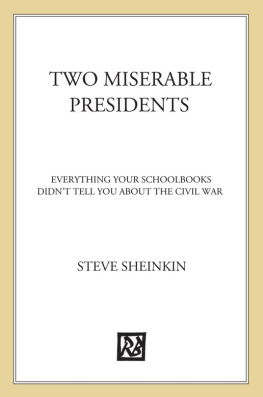The F Street Mess
CIVIL WAR AMERICA
Peter S. Carmichael, Caroline E. Janney, and Aaron Sheehan-Dean, editors
This landmark series interprets broadly the history and culture of the Civil War era through the long nineteenth century and beyond. Drawing on diverse approaches and methods, the series publishes historical works that explore all aspects of the war, biographies of leading commanders, and tactical and campaign studies, along with select editions of primary sources. Together, these books shed new light on an era that remains central to our understanding of American and world history.
2017 The University of North Carolina Press
All rights reserved. Manufactured in the United States of America. Designed by Sally Fry Scruggs and set in Utopia by codeMantra.
The University of North Carolina Press has been a member of the Green Press Initiative since 2003.
Cover illustration: J. Rodgers, View of the Senate of the United States in Session. U.S. Senate Collection, 38.00964.001.
Library of Congress Cataloging-in-Publication Data
Names: Malavasic, Alice Elizabeth, author.
Title: The F Street Mess : how Southern senators rewrote the Kansas-Nebraska Act / Alice Elizabeth Malavasic.
Other titles: Civil War America (Series)
Description: Chapel Hill : The University of North Carolina Press, [2017] | Series: Civil War America
Identifiers: LCCN 2017020439 | ISBN 9781469636474 (cloth : alk. paper) | ISBN 9781469635521 (pbk : alk. paper) | ISBN 9781469635538 (ebook)
Subjects: LCSH: United States. Kansas-Nebraska Act. | SlaveryUnited StatesExtension to the territories. | SlaveryPolitical aspectsUnited StatesHistory19th century. | OligarchyUnited States. | United States. CongressHistory19th century. | Atchison, David Rice, 18071886. | Butler, A. P. (Andrew Pickens), 17961857. | Hunter, R. M. T. (Robert Mercer Taliaferro), 18091887. | Mason, J. M. (James Murray), 17981871.
Classification: LCC E433 .M335 2017 | DDC 320.473/049dc23
LC record available at https://lccn.loc.gov/2017020439
For my father
MICHAEL JOHN MALAVASIC
19212007
Contents
A section of illustrations begins on page .
Acknowledgments
I am deeply grateful and indebted to the institutions that assisted me with the research for this book. I am and continue to be amazed at the knowledge, skill, and generosity of the congressional, university, and museum staff members who helped me with my questions and obscure searches. These institutions include but are not limited to the National Archives; Library of Congress; Historical Offices of the United States Senate and United States House of Representatives; Office of the Architect of the U.S. Capitol; Alderman Library Special Collections at the University of Virginia; Virginia Historical Society; South Caroliniana Library at the University of South Carolina; Fort Pulaski Historic Site, South Carolina; Western Historical Manuscript Division at the University of Missouri and State Historical Society of Missouri; Omaha Public Library in Omaha, Nebraska; Library Archives at the University of Illinois at Urbana Champaign; and Beinecke Rare Book and Manuscript Library at Yale University.
Success for a novice author such as myself is dependent on an experienced and highly skilled editorial staff, and in that regard I have been truly blessed. The University of North Carolina Press is worthy of its reputation and then some. There are many on its editorial staff whose names I do not know, but I am thankful for all the work they put into the publication of my book. I am especially grateful to executive editor Chuck Grench; Jay Mazzocchi, assistant managing editor; Brian MacDonald, copy editor; and acquisitions assistant Jad Adkins for their wisdom and their patience.
I would also like to thank my Hudson Valley Community College colleagues, Associate Professor of Library Sciences Valarie Lang Waldin, senior clerk Jennifer Acker, and program assistant Kathleen Haynes for their technical support in the preparation of the manuscripts final draft. Their professional skills are second to none. Thank you to my mentors and friends Richard Hamm, Dan White, and Joe Gould for their help on the manuscript and support throughout my academic career. Thank you to my family and friends whose love and support never waivers. And to my parents Michael and Emma Malavasic, both deceased. My mother gave me her southern heritage and love for its flawed but exceptional history. My father gave me his heart and his dreams. Anything good I have ever done or accomplished in this life is because I am their daughter.
Lastly, my profound gratitude to Scott Reynolds Nelson for his unrelenting advocacy of my work, for reading through the entire manuscript more than once, and for his insight and recommendations. I cannot begin to calculate the contributions Scott made except to say I could not have completed my book without him.
The F Street Mess
Introduction: Conspiracy
The order from Lieutenant General Ulysses S. Grant to Major General Henry W. Halleck
Hunter and Campbell had been picked for the commission in part because of their prewar reputations as leading intellectuals within their respective branches of government. They also shared the kind of noble dispositions that had garnered them the friendship as well as the respect of their political adversaries. Though alike in so many ways, they were startling different physically, Hunters dark complexion the Ying to Campbells fair-complexioned Yang. They were both lawyers and strict constructionists. But whereas Hunters constitutionalism had led him to become a leading defender of slavery and states rights, Campbell, a Unionist, eschewed both. Nevertheless, in the months leading up to the war, Hunter like Campbell became involved in the Washington negotiations to avoid secession. Then, when secession came anyway, Campbell like Hunter followed his state.
By 1865 both men were among those in the Confederate government calling for a negotiated settlement to end the war. Jefferson Davis opposed settlement but, faced with growing calls for peace in Richmond, appointed Vice President Stephens, Hunter, and Campbell to the peace commission, knowing Lincoln
On April 3, two months after the Hampton Roads Conference, Richmond fell to Union forces. Abraham Lincoln arrived in the city the following day and requested a meeting with Hunter and Campbell to discuss cessation of hostilities. Hunter did not attend the meeting between Lincoln and Campbell that day, but he and Campbell had been meeting together throughout the previous month.
News of Lincolns assassination had been immediate, and the residents of Washington City, who lived for four years in constant dread that the Virginia armies would any day come, were gripped by a combustible stew of hysteria, paranoia, sorrow, and anger that grew in intensity as the days passed. Americans living above the Mason Dixon line reacted with similar shock when the news of Lincolns assassination reached them. Northern anger did not dissipate for months.
Joseph Holt, judge advocate general of the Bureau of Military Justice, was put in charge of the investigation. Within hours five people, believed to have been directly involved in the assassination of Lincoln and the attempted assassination of Secretary of State William Seward, were arrested. Lincolns assassin, the actor John Wilkes Booth, was located and killed on April 26, at a farm near Port Royal, Virginia.
No one in the North, especially Edwin M. Stanton, the secretary of war, believed Booth and his accomplices had acted independently. Many inside and outside of the government believed Lincolns assassination had been approved at a much higher level to avenge the South and turn the tide of the


